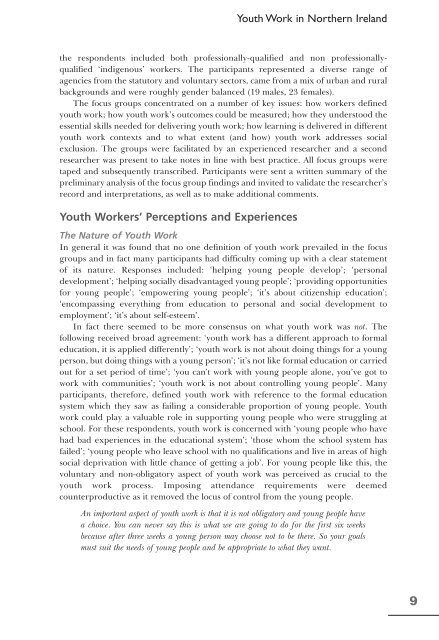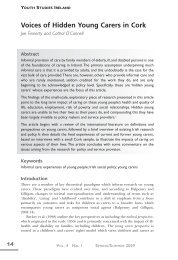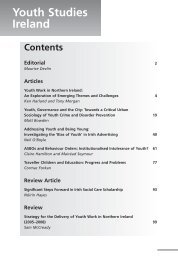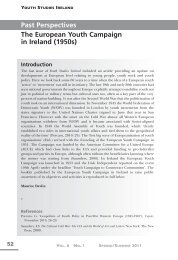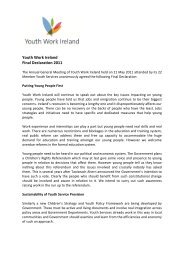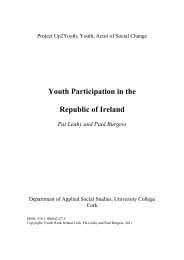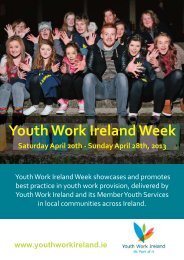Youth Work in Northern Ireland:
Youth Work in Northern Ireland:
Youth Work in Northern Ireland:
Create successful ePaper yourself
Turn your PDF publications into a flip-book with our unique Google optimized e-Paper software.
<strong>Youth</strong> <strong>Work</strong> <strong>in</strong> <strong>Northern</strong> <strong>Ireland</strong>the respondents <strong>in</strong>cluded both professionally-qualified and non professionallyqualified‘<strong>in</strong>digenous’ workers. The participants represented a diverse range ofagencies from the statutory and voluntary sectors, came from a mix of urban and ruralbackgrounds and were roughly gender balanced (19 males, 23 females).The focus groups concentrated on a number of key issues: how workers def<strong>in</strong>edyouth work; how youth work’s outcomes could be measured; how they understood theessential skills needed for deliver<strong>in</strong>g youth work; how learn<strong>in</strong>g is delivered <strong>in</strong> differentyouth work contexts and to what extent (and how) youth work addresses socialexclusion. The groups were facilitated by an experienced researcher and a secondresearcher was present to take notes <strong>in</strong> l<strong>in</strong>e with best practice. All focus groups weretaped and subsequently transcribed. Participants were sent a written summary of theprelim<strong>in</strong>ary analysis of the focus group f<strong>in</strong>d<strong>in</strong>gs and <strong>in</strong>vited to validate the researcher’srecord and <strong>in</strong>terpretations, as well as to make additional comments.<strong>Youth</strong> <strong>Work</strong>ers’ Perceptions and ExperiencesThe Nature of <strong>Youth</strong> <strong>Work</strong>In general it was found that no one def<strong>in</strong>ition of youth work prevailed <strong>in</strong> the focusgroups and <strong>in</strong> fact many participants had difficulty com<strong>in</strong>g up with a clear statementof its nature. Responses <strong>in</strong>cluded: ‘help<strong>in</strong>g young people develop’; ‘personaldevelopment’; ‘help<strong>in</strong>g socially disadvantaged young people’; ‘provid<strong>in</strong>g opportunitiesfor young people’; ‘empower<strong>in</strong>g young people’; ‘it’s about citizenship education’;‘encompass<strong>in</strong>g everyth<strong>in</strong>g from education to personal and social development toemployment’; ‘it’s about self-esteem’.In fact there seemed to be more consensus on what youth work was not. Thefollow<strong>in</strong>g received broad agreement: ‘youth work has a different approach to formaleducation, it is applied differently’; ‘youth work is not about do<strong>in</strong>g th<strong>in</strong>gs for a youngperson, but do<strong>in</strong>g th<strong>in</strong>gs with a young person’; ‘it’s not like formal education or carriedout for a set period of time’; ‘you can’t work with young people alone, you’ve got towork with communities’; ‘youth work is not about controll<strong>in</strong>g young people’. Manyparticipants, therefore, def<strong>in</strong>ed youth work with reference to the formal educationsystem which they saw as fail<strong>in</strong>g a considerable proportion of young people. <strong>Youth</strong>work could play a valuable role <strong>in</strong> support<strong>in</strong>g young people who were struggl<strong>in</strong>g atschool. For these respondents, youth work is concerned with ‘young people who havehad bad experiences <strong>in</strong> the educational system’; ‘those whom the school system hasfailed’; ‘young people who leave school with no qualifications and live <strong>in</strong> areas of highsocial deprivation with little chance of gett<strong>in</strong>g a job’. For young people like this, thevoluntary and non-obligatory aspect of youth work was perceived as crucial to theyouth work process. Impos<strong>in</strong>g attendance requirements were deemedcounterproductive as it removed the locus of control from the young people.An important aspect of youth work is that it is not obligatory and young people havea choice. You can never say this is what we are go<strong>in</strong>g to do for the first six weeksbecause after three weeks a young person may choose not to be there. So your goalsmust suit the needs of young people and be appropriate to what they want.9


